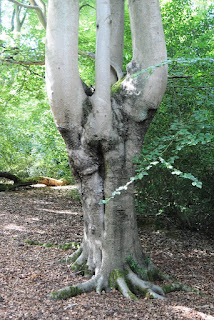Last week saw the launch of Rewilding Britain and an interesting piece on Channel 4 News in which George Monbiot returned to the Welsh sheep-farming 'Desert' he described in Feral. The clip embedded above includes interviews with rewilder Ritchie Tassell and sheep farmer Dafydd Jones, who speaks entirely in Welsh to emphasise the landscape's cultural ecology. Both feature in Feral and demonstrate opposing ways in which rewilding can be seen - as an attempt to reverse the long history of increasing estrangement from nature, or as the final step in a process that has driven people off the land. Tassell recalls his childhood in Northumberlandshire, when the last mixed farms disappeared: 'that was the worst of times in terms of habitat destruction, almost the final nail in the coffin of what John Clare was writing about.' But for Dafydd Jones, rewilding is a post-Romantic ideology, that seems to imagine a world without people. In Feral Monbiot tries to reconcile these positions, concluding that it would be possible to rebalance economic incentives so that 'people as well as wildlife will regain a footing on the land.'
Monbiot wrote about John Clare in one of his columns a few years ago, recalling how he documented 'both the destruction of place and people and the gradual collapse of his own state of mind. "Inclosure came and trampled on the grave / Of labour's rights and left the poor a slave … And birds and trees and flowers without a name / All sighed when lawless law's enclosure came." Enclosure removed Clare from the intimate Northamptonshire landscape he had experienes as a boy. Jay Griffiths, quoted in Feral, sees this as a historical moment that 'reaved children of the site of their childhood, robbed them of animal-tutors and river-mentors and stole their deep dream-shelters.' This is one of the concerns of Rewilding Britian, which is part of a wider movement to encourage children to reconnect with nature (discussed, for example, in the last chapter of Robert Macfarlane's recent book Landmarks). In Feral, Monbiot writes that 'of all the world's creatures, perhaps those in greatest need of rewilding are our children. ... Missing from children's lives more than almost anything else is time in the woods.' My own children see little of woodlands in Hackney but they did spend last weekend playing among the trees with their school friends on a parent-organised camping trip. We were in Epping Forest, not far from the spot where John Clare arrived one July day in 1837, to live at Dr. Allen's asylum.
Wandering through the forest and playing hide-and-seek among the trees it was impossible not to be struck by their strange shapes, with multiple trunks growing from their bases. They were regularly pollarded until the Epping Forest Act of 1878, which stipulated that the City of London Corporation "shall at all times keep Epping Forest unenclosed and unbuilt on as an open space for the recreation and enjoyment of the people". However, this preservation of the forest has affected its biodiversity as the trees' great crowns block out light, leaving the ground almost bear apart from dead leaves, bark and odd bits of rubbish. Some of the forest trees have multiple trunks at ground level, representing decades of growth since they were last coppiced. Their ability to regenerate after coppicing is the subject of a startling speculation in Feral: that our trees adapted to survive snapping and uprooting by the straight-tusked elephants that roamed across Europe until 40,000 years ago. Similarly, 'blackthorn, which possesses very long spines, seems over-engineered to deter browsing by deer; but not, perhaps to deter browsing by rhinoceros.' The toughness of holly, yew and box trees may reflect an ability to withstand threats that no longer exist.
'Even if these speculations do not lead to the reintroduction of elephants and rhinos, do they not render the commonplace astonishing? The notion that our most familiar trees are elephant-adapted, that we can see in their shadows the great beasts with which humans evolved, that the marks of these animals can be found in every park and avenue and leafy street, infuses the world with new wonders. Paleoecology - the study of past ecosystems, crucial to an understanding of our won - feels like a portal through which we may pass into an enchanted kingdom.'

No comments:
Post a Comment